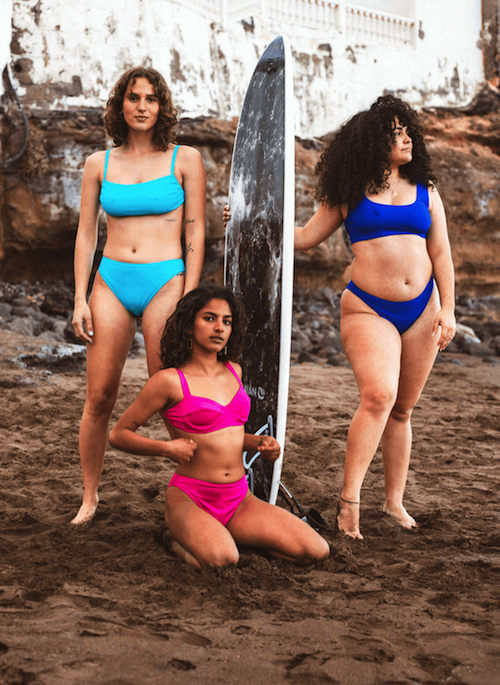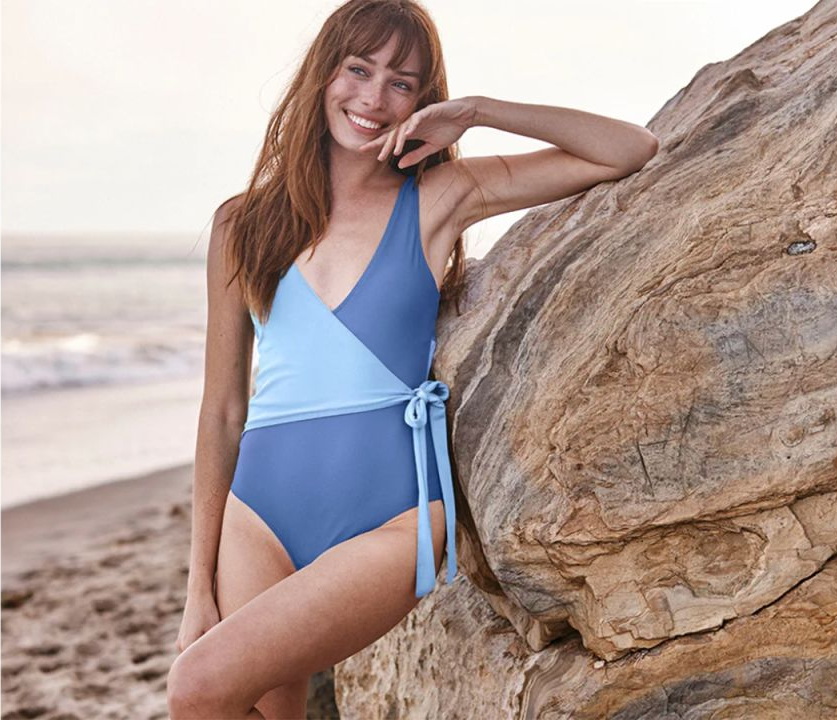Content Menu
● Introduction to Eco-Friendly Fashion
>> What is Eco-Friendly Fashion?
>> Why Should We Care?
● Recycled Materials in Swimwear
>> What are Recycled Materials?
>> How is Recycled Swimwear Made?
>> Benefits of Recycled Swimwear
● Understanding Slow Fashion
>> What is Slow Fashion?
>> Benefits of Slow Fashion
>> How to Practice Slow Fashion
● Ethical Production in Fashion
>> What is Ethical Production?
>> Why is Ethical Production Important?
>> Examples of Ethical Fashion Brands
● Zero Waste Clothing
>> What is Zero Waste Clothing?
>> How is Zero Waste Clothing Made?
>> Benefits of Zero Waste Clothing
● Top Sustainable Swimwear Manufacturers
>> 1. Abely Fashion
>> 2. Summersalt
>> 3. Outerknown
>> 4. Patagonia
>> 5. Vitamin A
>> 6. Do Good Swimwear
>> 7. Bali Swim
>> 8. AEL Apparel
>> 9. Farm Rio
>> 10. Boden
● Summary
>> What is Eco-Friendly Fashion?
>> Recycled Materials in Swimwear
>> Understanding Slow Fashion
>> Ethical Production in Fashion
>> Zero Waste Clothing
● Frequently Asked Questions (FAQs)
>> What is the Difference Between Slow Fashion and Fast Fashion?
>> Are Eco-Friendly Clothes More Expensive?
>> How Can I Start Making Eco-Friendly Fashion Choices?
>> Why is Ethical Production Important in Fashion?
>> Where Can I Buy Zero Waste Clothing?
Discover the top sustainable swimwear manufacturers of 2024 - Who is leading the way in eco-friendly beachwear production?
Introduction to Eco-Friendly Fashion
Have you ever heard of eco-friendly fashion? It's a way of dressing that not only makes you look good but also helps the planet. In this article, we'll explore what eco-friendly fashion is all about and why it's essential to care for the environment through our clothing choices.

What is Eco-Friendly Fashion?
Eco-friendly fashion is all about creating clothing in a way that minimizes harm to the environment. It involves using sustainable materials, reducing waste, and promoting ethical production practices. By choosing eco-friendly fashion, you're making a positive impact on the planet.

Why Should We Care?
It's crucial to care about eco-friendly fashion because the clothing industry can have a big impact on the environment. From the materials used to make clothes to the way they are produced and disposed of, fashion can contribute to pollution and waste. By opting for eco-friendly options, we can help reduce this impact and work towards a greener future.
Recycled Materials in Swimwear
When it comes to eco-friendly fashion, one innovative way designers are making a positive impact on the environment is through the use of recycled materials in swimwear. By reusing materials that would otherwise end up in landfills, these designers are helping to reduce waste and promote sustainability.
What are Recycled Materials?
Recycled materials are items that have been processed or converted into new products. In the world of swimwear, materials such as recycled plastic bottles, fishing nets, and even old fabric scraps can be transformed into stylish and functional swimsuits. This process not only reduces the amount of waste in our oceans and landfills but also conserves natural resources.
How is Recycled Swimwear Made?
The process of making swimwear from recycled materials involves collecting, sorting, and cleaning the recyclable materials. These materials are then broken down into fibers, which are spun into yarn and woven into fabric. The fabric is then cut and sewn into swimsuits, just like traditional swimwear. The end result is a beautiful and durable piece of swimwear that not only looks good but also does good for the environment.
Benefits of Recycled Swimwear
Choosing swimwear made from recycled materials comes with a host of benefits. Not only does it help reduce waste and conserve resources, but it also helps to minimize the environmental impact of traditional swimwear production. Additionally, recycled swimwear is often of high quality and can be just as stylish and comfortable as swimwear made from virgin materials. By opting for recycled swimwear, you can make a fashion statement while also supporting sustainable practices in the fashion industry.
Understanding Slow Fashion
Slow fashion is a term that describes an approach to clothing and fashion that emphasizes quality, sustainability, and ethical production. Unlike fast fashion, which focuses on producing large quantities of cheap clothing quickly, slow fashion prioritizes the well-being of the environment and the people involved in the production process.

What is Slow Fashion?
Slow fashion is a mindful and deliberate way of consuming clothing. It involves buying fewer items of higher quality that are made to last, rather than constantly purchasing cheap, disposable garments. Slow fashion encourages consumers to invest in pieces that are timeless and well-made, reducing the need for frequent replacements.
Benefits of Slow Fashion
Slow fashion has numerous benefits for both the environment and the people in the fashion industry. By choosing slow fashion, you are reducing the demand for mass-produced, low-quality clothing, which helps to decrease the environmental impact of the fashion industry. Slow fashion also promotes fair wages and safe working conditions for garment workers, ensuring that they are treated ethically and with respect.
How to Practice Slow Fashion
If you want to embrace slow fashion in your everyday life, there are several ways you can start making more sustainable clothing choices. Consider buying second-hand or vintage clothing, supporting local and independent designers, and investing in high-quality, versatile pieces that you can wear for years to come. By being conscious of your fashion choices and making informed decisions, you can contribute to a more sustainable and ethical fashion industry.
Ethical Production in Fashion
When we talk about ethical production in the fashion industry, we are referring to the practices followed by companies to ensure that the clothing they produce is made in a responsible and sustainable way. This involves considering the welfare of the workers involved in the production process, as well as the environmental impact of the manufacturing methods.
What is Ethical Production?
Ethical production means that the companies making our clothes are treating their workers fairly, providing safe working conditions, and paying them a living wage. It also involves using sustainable materials and production processes that minimize harm to the environment. By following ethical production practices, companies aim to create clothing that is not only stylish but also made with integrity.
Why is Ethical Production Important?
Ethical production is crucial because it ensures that the people making our clothes are not exploited or forced to work in unsafe conditions. It also helps to protect the environment by reducing waste and pollution generated during the manufacturing process. By supporting brands that prioritize ethical production, we can contribute to a more sustainable and just fashion industry.
Examples of Ethical Fashion Brands
There are many fashion brands that are leading the way in ethical production. Companies like Patagonia, Everlane, and Reformation are known for their commitment to fair labor practices, transparency in their supply chains, and use of eco-friendly materials. These brands serve as examples of how fashion can be both stylish and ethical, inspiring others in the industry to follow suit.
Zero Waste Clothing
Zero waste clothing is a sustainable approach to fashion that aims to minimize waste throughout the manufacturing process. Instead of discarding excess fabric or materials, zero waste clothing focuses on using every piece efficiently to create beautiful and functional garments.
What is Zero Waste Clothing?
Zero waste clothing is a design strategy that eliminates textile waste during production. Designers carefully plan patterns and cuts to maximize fabric usage, leaving little to no scraps behind. This method promotes sustainability by reducing the amount of material that ends up in landfills.
How is Zero Waste Clothing Made?
Creating zero waste clothing involves meticulous planning and innovative design techniques. Designers strategically layout patterns to minimize leftover fabric and utilize cutting methods that generate minimal waste. By reimagining traditional garment construction, zero waste clothing can be achieved without sacrificing style or quality.
Benefits of Zero Waste Clothing
Choosing zero waste clothing has several benefits for the environment. By reducing textile waste, this approach helps conserve valuable resources and minimize the impact on landfills. Additionally, zero waste clothing promotes sustainable practices within the fashion industry, inspiring creativity and innovation in design.
Top Sustainable Swimwear Manufacturers
Here are the Top 10 Sustainable Swimwear Manufacturers in 2024:
1. Abely Fashion
Overview: Abely Fashion is committed to sustainability, using eco-friendly materials and ethical manufacturing practices. They focus on stylish designs that do not compromise on environmental responsibility.
Sustainability Practices: Utilizes recycled materials and ensures fair labor practices.
Product Range: Offers a variety of swimwear styles, including bikinis, one-pieces, and cover-ups.
Market Presence: Gaining popularity in eco-conscious fashion circles.
2. Summersalt
Overview: Known for its comfortable and stylish swimwear, Summersalt uses recycled textiles and has a patented fit process.
Sustainability Practices: Focuses on using recycled polyamide and ethical production methods.
Product Range: Offers separates and one-pieces, including maternity options.
Market Presence: Popular among consumers looking for stylish yet sustainable options.
3. Outerknown
Overview: Founded by surfer Kelly Slater, Outerknown emphasizes quality and sustainability in its swimwear.
Sustainability Practices: Sources materials from renewable energy facilities and supports fair labor practices.
Product Range: Offers a range of surf suits and board shorts.
Market Presence: Well-regarded in the surfing community and among eco-conscious consumers.
4. Patagonia
Overview: A pioneer in sustainable outdoor clothing, Patagonia also offers a range of swimwear.
Sustainability Practices: Uses recycled materials and promotes environmental activism.
Product Range: Includes swim trunks, bikinis, and one-pieces.
Market Presence: Strong brand loyalty among environmentally conscious consumers.
5. Vitamin A
Overview: Known for its luxurious swimwear made from sustainable materials.
Sustainability Practices: Uses EcoLux® fabric made from recycled nylon.
Product Range: Offers a variety of stylish swimwear options.
Market Presence: Popular among fashion-forward consumers looking for eco-friendly options.
6. Do Good Swimwear
Overview: Focuses on vibrant, eco-friendly swimsuits.
Sustainability Practices: Uses ECONYL® regenerated nylon and contributes to ocean conservation efforts.
Product Range: Offers a range of colorful bikinis and one-pieces.
Market Presence: Gaining traction among consumers who value both style and sustainability.
7. Bali Swim
Overview: A Bali-based manufacturer known for eco-conscious swimwear.
Sustainability Practices: Focuses on using sustainable materials and ethical production methods.
Product Range: Offers a variety of swimwear styles for men and women.
Market Presence: Popular among tourists and eco-conscious consumers.
8. AEL Apparel
Overview: A custom swimwear manufacturer based in China.
Sustainability Practices: Emphasizes eco-friendly materials and waste reduction.
Product Range: Offers a wide range of custom swimwear designs.
Market Presence: Known for its quick turnaround and customization options.
9. Farm Rio
Overview: A vibrant brand from Brazil that focuses on sustainability.
Sustainability Practices: Uses eco-friendly materials and supports local artisans.
Product Range: Offers colorful and fun swimwear options.
Market Presence: Popular among consumers looking for unique and sustainable fashion.
10. Boden
Overview: A UK-based brand known for its stylish and sustainable swimwear.
Sustainability Practices: Uses recycled materials and promotes ethical manufacturing.
Product Range: Offers a variety of swimwear styles for all body types.
Market Presence: Gaining popularity in the UK and beyond for its commitment to sustainability.
These manufacturers are leading the way in sustainable swimwear, combining style with eco-friendly practices. If you need more information about any specific brand or have other questions, feel free to ask!
Summary
In this blog post, we explored the world of eco-friendly fashion and its importance in caring for the environment. Eco-friendly fashion involves using green business practices to create clothing that is sustainable and ethical.
What is Eco-Friendly Fashion?
Eco-friendly fashion focuses on creating clothing with minimal impact on the environment. It involves using recycled materials, promoting slow fashion, practicing ethical production, and embracing zero waste clothing.
Recycled Materials in Swimwear
Swimwear made from recycled materials is a great example of eco-friendly fashion. By using materials like recycled plastic bottles or old fishing nets, we can reduce waste and protect the oceans.
Understanding Slow Fashion
Slow fashion is a movement that encourages us to buy less and choose quality over quantity. By investing in timeless pieces and supporting ethical brands, we can reduce our carbon footprint and support fair labor practices.
Ethical Production in Fashion
Ethical production in the fashion industry ensures that workers are treated fairly and the environment is respected. Brands that follow ethical practices prioritize transparency, fair wages, and safe working conditions.
Zero Waste Clothing
Zero waste clothing aims to minimize waste by utilizing every part of the fabric during the production process. This sustainable approach reduces landfill waste and promotes resource conservation.
By making eco-friendly fashion choices, we can contribute to a healthier planet and a more sustainable future. Let's continue to support brands that prioritize recycled materials, slow fashion, ethical production, and zero waste practices.
Frequently Asked Questions (FAQs)
What is the Difference Between Slow Fashion and Fast Fashion?
Slow fashion focuses on quality, sustainability, and ethical production. It promotes buying fewer high-quality items that last longer, while fast fashion prioritizes cheap, trendy clothes produced quickly, often leading to environmental and social issues.
Are Eco-Friendly Clothes More Expensive?
While some eco-friendly clothes may have a higher price tag due to sustainable practices and quality materials, there are affordable options available. Investing in durable, timeless pieces can save money in the long run by reducing the need for frequent replacements.
How Can I Start Making Eco-Friendly Fashion Choices?
To start your eco-friendly fashion journey, consider buying second-hand or vintage clothing, supporting sustainable brands, recycling and upcycling your clothes, and educating yourself on sustainable fashion practices. Small changes in your shopping habits can make a big difference.
Why is Ethical Production Important in Fashion?
Ethical production ensures fair wages, safe working conditions, and environmentally friendly practices in the fashion industry. By supporting brands that prioritize ethical production, you are contributing to a more sustainable and compassionate fashion industry.
Where Can I Buy Zero Waste Clothing?
You can find zero waste clothing from brands that focus on sustainable practices and waste reduction. Look for eco-friendly fashion brands, thrift stores, and online platforms that promote zero waste fashion. Supporting these brands encourages a more environmentally conscious approach to clothing production.


































































